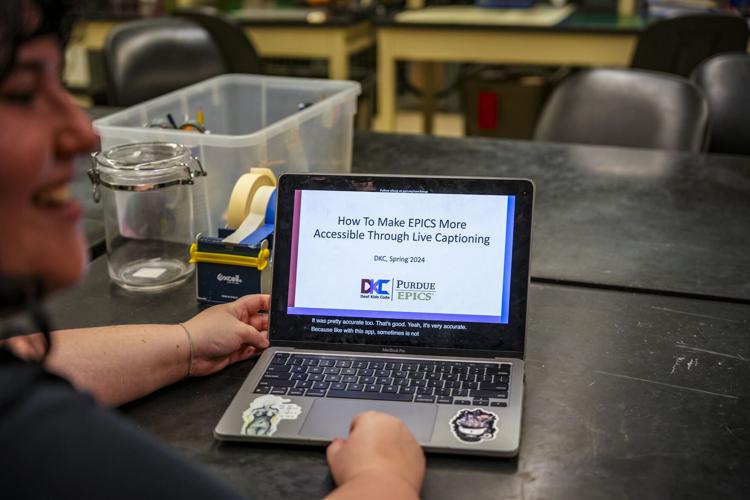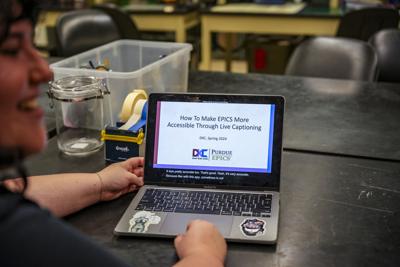For senior in electrical engineering, Amalia Rosenthal, what started out as an Engineering Project in Community Service (EPICS) developed into something even bigger than she imagined.
Rosenthal’s project is centered around LCE: live captioning environments. She is pushing for more classrooms to include live captioning alongside lectures, making classes more accessible for students who are deaf or hard of hearing.
“So it actually started out as a research project and has kind of moved in toward making a social movement on campus,” she said.
The main platform Rosenthal said is the easiest to use is PowerPoint, which has a live captioning feature that can be turned on at the click of a button.
Despite the PowerPoint feature’s potential benefits, Leah Jamieson, Rosenthal's EPICS advisor and professor of electrical and computer engineering, said encouraging professors to implement it has not been easy.
“(Some professors) say, ‘Well, I do not have any deaf students in my class,’” Jamieson said. “But rather, you know, this is something that would help everybody, even people who hear perfectly well.”

Amalia Rosenthal, a senior in electrical engineering, works on her capstone project primarily in the EPICS lab, which has electrical equipment and various tools available. According to Rosenthal, she mainly uses her laptop to work on her project.
Rosenthal said research shows closed captioning can also help students who are neurodivergent.
“What you can do is actually pull up the presentation on your own device and have the captioning right on your computer,” she said. “For people who are able bodied, or neurotypical, it does improve comprehension, focus and retention.”
Since students are also able to pull up the closed captioning after the lecture is over, Rosenthal suggests professors could see better test scores as a result.
“This (PowerPoint feature) adds a dimension of learning, so what if we just did it campus wide?” Jamieson said. “It's a way of creating a richer environment for everyone to take in information and learn.”
Another concern surrounding the PowerPoint presentation is its accuracy.
“What I’ve heard from those with accessibility issues is ‘anything is better than nothing,’” Rosenthal said. “So even if it does miss a word every once in a while or mistranslate, it helps enough that they can get a kind of context.”
With Rosenthal graduating next month, she is hoping that current students would be willing to carry on her legacy.
“One of my main endeavors of doing this project right now is trying to find good replacements for those who are graduating,” she said.

Amalia Rosenthal, a senior in electrical engineering, explains her senior capstone project aiming to bring live captioning to the classroom.
Although she is an aspiring engineer, a lot of the work she does for this project involves communication and marketing. Activities like emailing, making posters and social media have taken up a good chunk of her time.
“I am trying to meet with those in communications majors and liberal arts majors to take over my project once I leave.”


















(0) comments
Welcome to the discussion.
Log In
Keep it Clean. Please avoid obscene, vulgar, lewd, racist or sexually-oriented language.
PLEASE TURN OFF YOUR CAPS LOCK.
Don't Threaten. Threats of harming another person will not be tolerated.
Be Truthful. Don't knowingly lie about anyone or anything.
Be Nice. No racism, sexism or any sort of -ism that is degrading to another person.
Be Proactive. Use the 'Report' link on each comment to let us know of abusive posts.
Share with Us. We'd love to hear eyewitness accounts, the history behind an article.